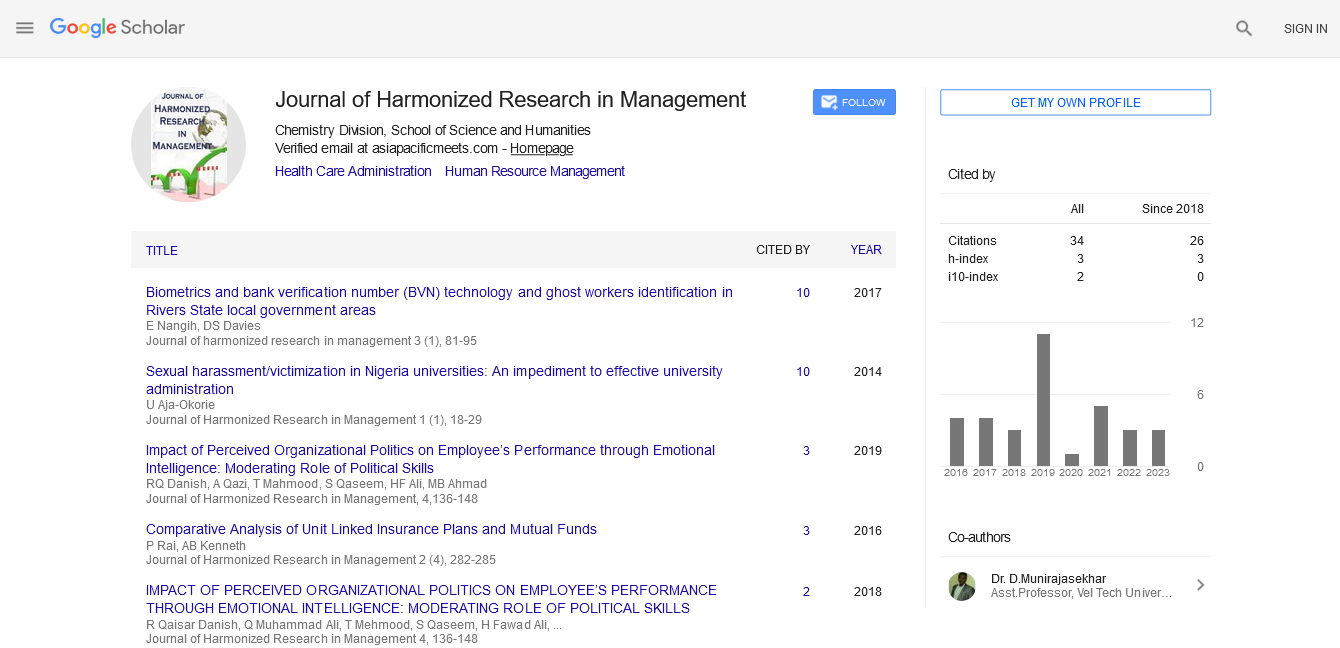Short Communication - (2022) Volume 8, Issue 2
CORPORATE SOCIAL RESPONSIBILITY ON A SUSTAINABLE INTERNAL BASIS AND BUSINESS PERFORMANCE IN ADVANCED ECONOMIES
Fasilat John*Received: Sep 01, 2022, Manuscript No. JHRM-22-77720; Editor assigned: Sep 05, 2022, Pre QC No. JHRM-22-77720 (PQ); Reviewed: Sep 19, 2022, QC No. JHRM-22-77720; Revised: Sep 27, 2022, Manuscript No. JHRM-22-77720 (R); Published: Oct 05, 2022, DOI: 10.30876/2354-5384.22.8.131
Description
Corporate Social Responsibility (CSR) is defined as “actions that seem to serve some societal benefit, beyond the interests of the firm and that which is required by law is used generally. In theory and in fact, CSR can fulfil a variety of roles and functions, be directed at various audiences, and be supported by a variety of different drivers. According to Garriga and Melé’s classification of CSR theories, CSR can be seen as instrumental (a way to advance and achieve economic objectives through social activities), political (a mechanism to influence policy), integrative (a way to proactively and reactively respond to social demands to achieve social legitimacy and acceptance), and ethical (a way to uphold moral standards) [1].
Governments and commercial firms in emerging economies have adapted to such circumstances by learning from best practises in mature economies, such as the rule of law and governance systems, in order to achieve sustainable economic growth and meet social welfare objectives. As a result, corporate social responsibility has emerged as the most exciting topic of business management and has, in recent years, attracted significant research interest from both academic and media organisations. Economic duties, legal responsibilities, ethical responsibilities, and philanthropic responsibilities are the four main tiers on which CSR is founded. CSR is a concept that businesses use to voluntarily incorporate social and environmental issues into their operations and interactions with stakeholders, according to the European Commission. In order to solve the primary issues in the UN’s Sustainable Development Goals (SDGs), CSR practises are expanded to encompass duties to employees, customers, suppliers, shareholders, the social community, and the environment [2].
An increasing amount of CSR indicates that social responsibility initiatives not only help businesses achieve their financial objectives (such as brand recognition, profit, and competitive advantage), but also satisfy societal needs and demands (e.g., education, health, poverty alleviation). Such responsible programmes adhere to governmental norms and procedural rules (such as accountability, openness, and reporting) and strengthen partnerships between the public and private sectors in support of the country’s economic transition. There are several restrictions on this study [3]. To generalise the factual picture of sustainable practises in the context of other business sectors, it may not be sufficient that the empirical study was conducted on medium-sized manufacturing enterprises. Additionally, since a questionnaire was used as the main technique of data collecting, workers might have omitted certain information that would have improved the study’s trustworthiness. Therefore, qualitative research methods should be used in future studies to further strengthen the validity.
Limitations
First, the generalizability of our framework may be constrained by the absence of empirical model testing and access to commercial statistics on business reports. Therefore, future research should examine how corporate taxation and corrupt practises of outside authorities affect the strategic decisions made later on about social spending by the central CSR Company. Second, because this study has adopted an exploratory methodology, based on interview and field data may help us better understand whether social initiatives managed by CSR implementing organisations contribute to the special advantages and financial success of the focus CSR firm [4]. Third, future research could examine the connection between managerial choices and comparative aspects of CSR, corporate governance, judicial system quality, labour laws, and taxes in various nations. This study only looked at one institutional setting for an emerging economy, namely India’s statutory CSR provisions and disclosure guidelines [5].
A complicated, rapidly expanding, fragmented market outside of general medicine, the cosmetic treatments industry is inextricably linked to body image in problematic ways. This study looked at the factors that influence and impediments to the development of a CSR agenda among senior UK industry professionals drawn from various sectors, in the context of several national scandals (such as PIP) and the absence of cogent, precise, and enforced regulation, as well as subsequent calls for the industry to be more “socially responsible” and engage in CSR. The results show that, in accordance with a medical approach to ethical practise, opinions on social duty were generally confined by the belief that the industry’s responsibility stopped at the level of the patient. In light of this, extrinsically motivated change is probably necessary for the sector to become more socially conscious, especially when considering poor body image on a larger scale. Notably, research participants appreciated the idea of more thorough and consistent regulation. When necessary, business and consumer theory should be incorporated into body image research to help industries tackle the major problem of negative body image.
References
- Balzarova MA, Castka P. The case of multiple stakeholder approach to ISO 26000 development Stakeholders’ influence and contribution to social standards development. J Bus Ethics. 2012;111(2):265-79.
- Barki H, Pinsonneault A. A model of organizational integration, implementation effort, and performance. Organ Sci. 2005;16(2):165-79.
- Aftab J, Sarwar H, Amin A, Kiran A. Does CSR mediate the nexus of ethical leadership and employee’s job performance? Evidence from North Italy SMEs. Soc Responsib J 2021;18(1): 154-177.
- Meyer KE, Peng MW. Theoretical foundations of emerging economy business research. J Int Bus 2016;47(1):3-22.
- Lee Y. Bridging employee advocacy in anonymous social media and internal corporate social responsibility (CSR). Manag Decis. 2021;59(10): 2473-2495.

Google Scholar citation report
Citations : 92
Journal of Harmonized Research in Management received 92 citations as per google scholar report









